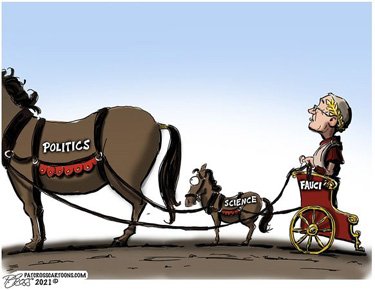Category Archive 'Politicized Science'
10 Jun 2021


Leighton Woodhouse points out the intrinsic irony of calls for “Faith in Science.”
In The Revolt of the Public, Martin Gurri traces the exalted status of the modern scientist to the mythical figure of the early twentieth century renegade scientific genius, embodied most famously by Albert Einstein. Einstein, Gurri reminds us, was hardly a creature of the academy. He nearly dropped out of high school, and when he began publishing his scientific insights he was working not at a university but at the patent office. But Einstein’s singular genius, combined with his tenacious devotion to The Truth, made him first the equal and then the superior of every credentialed academic in the world. Like Copernicus, the intrepidness of Einstein’s spirit and the independence of his mind elevated him above the banal muck of human affairs, bringing him a step closer to the gods of nature.
This mythological image, Gurri writes, remains the template for our popular conception of the professional scientist. But the myth is wildly at odds with the reality of what science is today.
The modern scientific research industry is like a cross between a giant perpetual motion machine and a game of musical chairs. Scientific research is underwritten, in large part, by a steady stream of government funding. To keep the lights on in their labs, scientists need to tap into that stream. They do so by designing research projects that conform to whatever the government prioritizes at any particular moment. If, for instance, there was just a major terrorist attack and Congress was concerned about the threat of bioterrorism, scientific research that related to that concern would be likely to be fast tracked for funding, so it may be a good time for a savvy principal investigator to start pitching projects aimed at developing vaccines for bioengineered pathogens. The successful scientist is the one who is particularly adept at writing fundable grant applications pegged to some politically salient research objective, and then generating laboratory results that make some sort of incremental progress toward that objective to justify a renewal of that grant funding in the next cycle.
The modern professional scientist is thus less like Albert Einstein than like his co-workers at the patent office. He is a bureaucrat, albeit a highly technical one. His goal is, to be sure, to seek The Truth, but only within the very narrow parameters of what other bureaucrats and politicians have deemed to be questions worth asking.
Anthony Fauci is the Platonic form of the scientist-technician-bureaucrat, which is why he has held his position as one of the top scientists in the nation for decades and through multiple administrations. As a creature of both science and politics, he has made himself indispensable as an interface between the two worlds and as the individual best positioned to mold the former to suit the needs of the latter. After 9/11, he transformed NIH into the agency at the front line of defending America against the imminent threat of jihadis armed with weaponized plague viruses. He championed “gain-of-function” research, which essentially meant building those superviruses before the terrorists did, the better to find vaccines for them. And once the Islamic terrorist threat faded a bit from our collective memory, he re-tooled this heftily-funded research into humanity’s front line of defense against Mother Nature, “the worst bioterrorist.” Unfortunately for Fauci, in the process, he may have — oops! — created one of the biggest pandemics in human history. …
At every such juncture, we’ve been admonished to “believe the science.” But this is not science; it’s politics. Science demands a reflexive posture of skepticism toward received wisdom, tempered by trust in empirical evidence. Bowing habitually to expert authority on the strength of titles and credentials is the antithesis of the scientific mindset. It is precisely what Democrats adopted the “party of science” moniker to reject: willful obedience to those who hold cultural and political power.
RTWT
02 Nov 2020


Pasha Kamyshev (Pierson 2009) correctly observes that politicization of Science and arguments consisting only of appeals to credentialed authority have widely underminded respect for experts and what purports to be science.
My current view is that large numbers of fields which are considered “scientific†in the West are a complete mess and lack the essential feature of what it means to be a science in the first place. …
Big Tech has fully bought into the frame of “experts†vs “laypeople†as if experts are always “correct†and laypeople are “wrong,†(unless they are repeating a statement by the experts).
If the laypeople are “wrong,†then there has been a massive failure of education to produce correct models for people to use for home reasoning. Obviously, the default answer for many people is to simply pour more money into education. But we lack understanding of what science and science education even are. Science is meant to produce world models, and education is supposed to impart them to everyone else. Neither is doing this, really, and what we have in place of those instructions is one large uncanny valley of ever-changing statement production. …
I have heard stories of professors at Yale in one department being mad about professors in another department teaching p-hacking to students. Inter- and intra-discipline fights are common, which isn’t necessarily a bad thing as long as the overall combined output of the field is correlated with reality. However, the journalistic tendency to signal boost any paper that can have political impact amplifies some fights over others, further screwing up an already shaky system.
So right now science is losing its status among the general population. It is also losing status among those who can actually read statistics. This is both horrifying and encouraging. Without a structured way to sift actual reality into social reality, the social reality will diverge from reality, with further and further breakdown of health and sanity for society.
RTWT
04 Aug 2008

The Telegraph reports that Britain’s historic Royal Navy, which so long successfully defended the island nation from Continental invasion, is proving centuries later also in retrospect an effective defense against junk science.
Scientists have uncovered a treasure trove of meteorological information contained in the detailed logs kept by those on board the vessels that established Britain’s great seafaring tradition including those on Nelsons’ Victory and Cook’s Endeavour.
Every Royal Naval ship kept a detailed record of climate including air pressure, wind strength, air and sea temperature and major meteorological disturbances.
A group of academics and Met Office scientists has unearthed the records dating from the 1600s and examined more than 6,000 logs, which have provided one of the world’s best sources for long-term weather data.
Their studies have raised questions about modern climate change theories. A paper by Dennis Wheeler, a geographer based at Sunderland University, recounts an increasing number of summer storms over Britain in the late 17th century.
Many scientists believe that storms are caused by global warming, but these were came during the so-called Little Ice Age that affected Europe from about 1600 to 1850.
The records also suggest that Europe saw a spell of rapid warming, similar to that experienced today, during the 1730s that must have been caused naturally.
Take my drum to England, hang et by the shore,
Strike et when your powder’s runnin’ low;
If the Dons sight Devon, I’ll quit the port o’ Heaven,
An’ drum them up the Channel as we drummed them long ago.
–Sir Francis Drake, according to Henry Newbolt.
18 Jul 2008


APS Governors Questioning Physics & Society Unit
While the ineffable Albert Gore, posing in front of a row of American flags, yesterday advanced the modest proposal that Americans should “move beyond partisan divisions,” and agree to be forced by government to abandon the use of every form of fossil fuel, simply abandoning trillions of dollars of corporate and private infrastructure, and spending even more on brand new windmills and hamster wheels, an outbreak of heresy was discovered within the most prestigious circles of the scientific community itself.
The American Physical Society’s Forum on Physics & Society the same day announced its intention of conducting a debate on Anthropogenic Global Warming, and went so far as to allege the existence of substantial dissent from orthodoxy within the scientific community.
There is a considerable presence within the scientific community of people who do not agree with the IPCC conclusion that anthropogenic CO2 emissions are very probably likely to be primarily responsible for the global warming that has occurred since the Industrial Revolution. Since the correctness or fallacy of that conclusion has immense implications for public policy and for the future of the biosphere, we thought it appropriate to present a debate within the pages of P&S concerning that conclusion.
The APS governing board was clearly not happy that one of the Physical Society’s internal units has the effrontery to conduct a debate upon the factual basis of a conclusive political position adopted by the same board last November. The APS web-site is pointedly proclaiming its certainty that mankind was at fault all over again.
The American Physical Society reaffirms the following position on climate change, adopted by its governing body, the APS Council, on November 18, 2007:
“Emissions of greenhouse gases from human activities are changing the atmosphere in ways that affect the Earth’s climate.”
So there.
——————————————-
It appears that it was Daily Tech‘s posting proclaiming that The American Physical Society, an organization representing nearly 50,000 physicists, has reversed its stance on climate change, under a headline stating Myth of Consensus Explodes that provoked the APS governing board’s denial of a change of stance.
Your are browsing
the Archives of Never Yet Melted in the 'Politicized Science' Category.
/div>

Feeds
|






